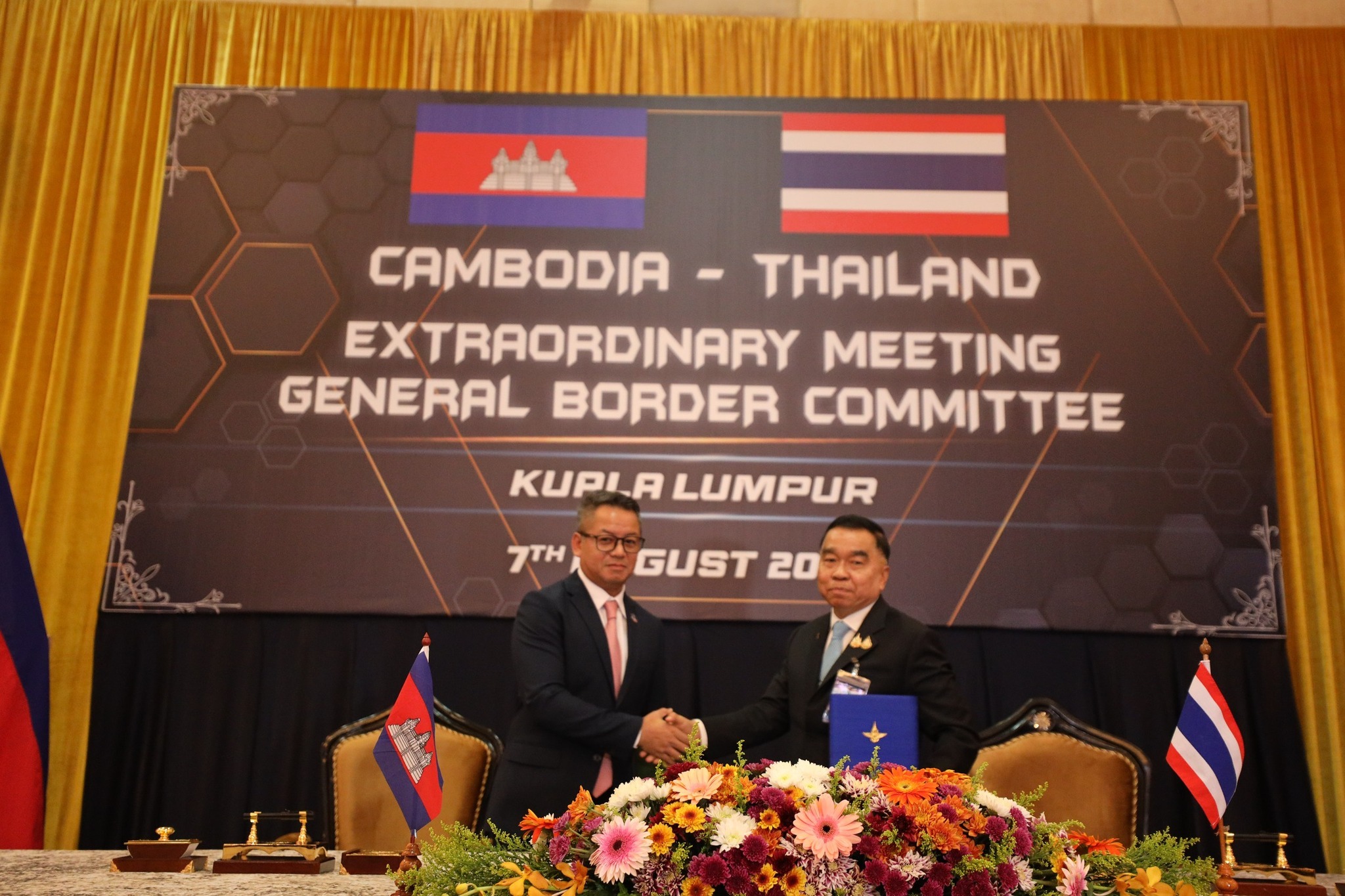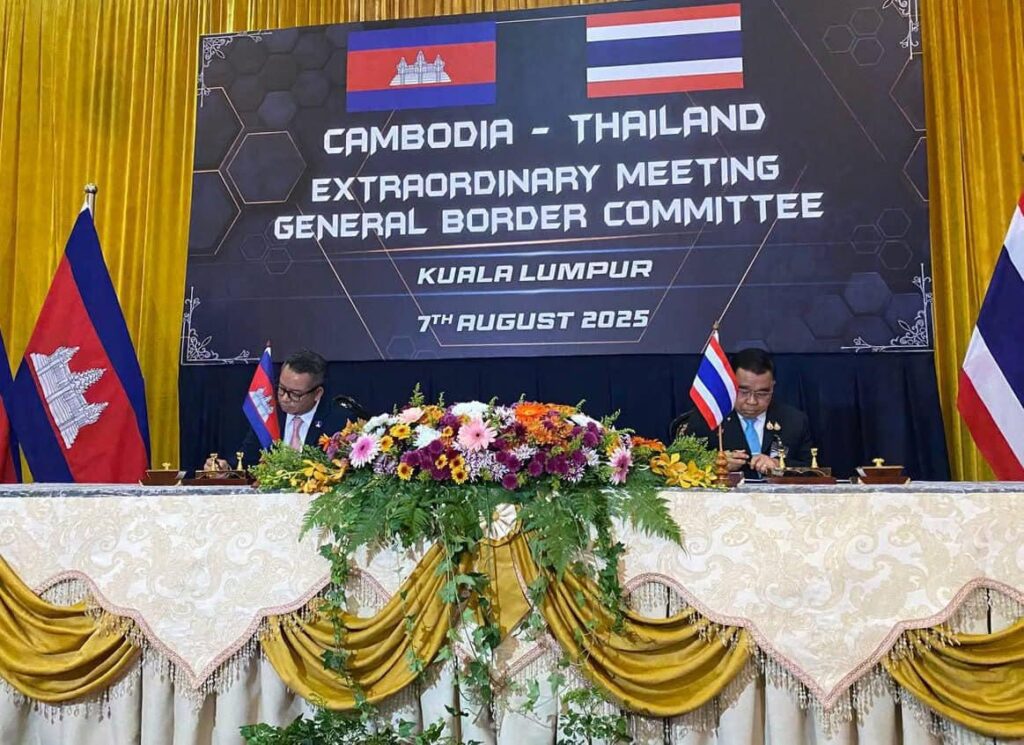The extraordinary General Border Committee (GBC) meeting in Malaysia between Thailand and Cambodia has seen the two countries currently in the border dispute agree on 13 critical points of ceasefire arrangements and implementations, highly hoped for by concerned parties to help resolve border tensions and return peace to the border
The Extraordinary Session of the General Border Committee (GBC) Meeting, hosted in Kuala Lumpur by Malaysia yesterday, is a follow-up to the ceasefire agreement on July 28. It lasted over one hour, at the end of which both sides agreed on those 13 points, including the cessation of use of all types of weapons, attacks on civilians and military objectives included, as well as the formation of the ASEAN Observer Team and its interim team.
The Thai delegation was led by Deputy Minister and Acting Minister of Defence General Nattaphon Narkphanit. He was accompanied by the Permanent Secretary of Defence, General Snitchanok Sangkhachan, and the Chief of Defence Forces, General Songwit Noonpackdee, as well as high-ranking officials from the Ministries of Defence and Foreign Affairs. But the Army Commander did not join the trip.
The Cambodian side, meanwhile, was led by its Deputy Prime Minister and Defence Minister Tea Seiha. The two ministers met for the first time after the fighting as Gen Natthaphon paid a courtesy call upon his arrival on the Prime Minister of Malaysia and ASEAN Chair, Dato’ Seri Anwar Ibrahim.
They then attended the GBC meeting in the afternoon, where they had spent around one hour confirming the points prepared by their Secretariates and signing the Agreed Minutes, seen as their official agreement over the terms of the ceasefire.


Affirmation of bilateral mechanisms
General Natthapol revealed in his press conference that during their morning discussions, PM Anwar had expressed his pleasure at the ceasefire and the positive progress in the Thai-Cambodian GBC discussions, which were considered an important step in implementing the ceasefire.
The Malaysian Prime Minister told them that he had held discussions with leaders of various ASEAN member states, and they agreed that resolving the Thai-Cambodian border issue is “a bilateral matter” between Thailand and Cambodia, which is in line with Thailand’s approach. Malaysia would only assist in coordinating as deemed necessary, with ASEAN’s support, PM Anwar was quoted by Gen Natthapol as saying.
Gen Natthapol said the Malaysian Prime Minister also welcomed an interim observer team led by the Malaysian military attaché and comprising only the military attachés from ASEAN member countries (Thailand, Malaysia, and Cambodia). The United States and China will not participate, but are willing to provide any support that Thailand and Cambodia deem appropriate.
Gen Natthapol further said he had stressed in the meeting about Cambodia’s actions after the ceasefire. While the ceasefire was agreed at midnight on July 28, the Cambodian side was found to have violated it, whereas the Thai side strictly followed it. Cambodia’s violation of the ceasefire prompted Thailand to respond in self-defence despite using its utmost restraint, he noted.
Currently, the border situation looks calm, but it is found, still, that Cambodia has reinforced its forces in the area. There is also the use of drones to spy on various areas of Thailand, the Thai acting minister further noted, while remarking that this is “a provocative act” and may cause misunderstandings between each other.
Furthermore, disinformation by Cambodia is still prevailing, an act which he viewed as not being constructive and conducive towards fruitful negotiations and the restoration of trust between the two countries.
However, Cambodia’s policymakers at the meeting had apparently demonstrated sincerity towards the ceasefire, so the ceasefire violation could be arbitrary by Cambodia’s military personnel in the fighting areas, Gen Natthapol remarked, apparently trying to safe face for Cambodia.
He further added: “Therefore, my intention in attending the meeting is to discuss with the Cambodian side straightforwardly and honestly, to find a way to make the ceasefire sustainable and bring peace and tranquillity back to the Thai-Cambodian border to ultimately benefit the people of both countries so that they can return to normal life.”

Credit: NNT
The key outcomes
Gen Natthapol then lined up what both sides principally agreed upon. There are five main points. First, both sides strictly adhere to the ceasefire covering all types of weapons, and to maintain troops at their current locations from the date of the ceasefire without any further reinforcement.
Second, there will be a temporary observer team, comprising ASEAN Defence Attaches to Thailand and Cambodia, led by the Malaysian Defence Attache, which will regularly observe the respective border areas without crossing the border. It will coordinate closely with the Regional Border Committees (RBCs) and GBCs in each country to ensure that there is no violation of the ceasefire by either side.
Third, both parties will refrain from provocative actions, including military actions and disinformation or false news dissemination, in order to foster the atmosphere for dialogues and to find a peaceful solution.
Fourth, both parties will strictly adhere to international humanitarian law, and during the immediate term, the bodies of the dead soldiers will be collected and repatriated to their countries in a dignified manner. Repatriation of “prisoners of war”, in accordance with international law, will take place immediately after the complete cessation of active hostilities in accordance with the Third Geneva Convention. Gen Natthapol assured his counterpart that Thailand has provided full care to these individuals in accordance with international humanitarian law.
Last but not least, both parties will maintain channels of dialogue and use existing bilateral mechanisms to solve the problems that may arise and prevent them from escalating. After this, there will be an RBC meeting within two weeks to coordinate the implementation of the latest agreed-upon points, and there will also be another GBC meeting in one month to follow up on the progress of this GBC meeting.
General Natthapol said the Thai side had also raised two more important issues, but the Cambodian side has not yet responded, requesting the meeting this time to focus on the ceasefire only. They include cooperation in mine clearance and cooperation in combating transnational crime, especially online fraud or online scams, which Gen Natthapol said are having a wide impact on Thai people and other countries in the region.
“I would like to reiterate that whether the agreed points today will yield tangible results or not depends on the cooperation and sincerity of both sides. I reaffirm that the Thai side will continue to uphold honest and sincere cooperation and dialogues based on the principle of good neighbourliness, and I hope that Cambodia will do the same.
“Ultimately, Thailand and Cambodia are neighbours, sharing a common border, and we cannot move away from each other. We are members of the ASEAN family. If both countries can quickly resolve these issues, it will bring peace to the border areas, and the people of both countries will be able to return to normal, peaceful lives,” said General Nattapol.
Shortly after the agreement, Cambodia’s PM Hun Manet issued a statement congratulating on the success of the GBC meeting. He said in his post on Facebook that the meeting was an implementation of the points agreed between him and Thailand’s acting PM in Putrajaya, Malaysia, on July 28. The Cambodian premier has also nominated U.S. President Donald Trump for the Nobel Peace Prize for his role in initiating the ceasefire talks between the two countries.
The U.S. Secretary of State, Marco Rubio, also issued a statement, saying the U.S. welcomes the GBC meeting as an important step forward in solidifying the ceasefire arrangement and establishing the ASEAN observation mechanism. He said he and President Trump expect the governments of Cambodia and Thailand to fully honour their commitments to end this conflict.
“We look forward to supporting Malaysia, ASEAN, and both countries as this process moves forward,” said Mr. Rubio in his statement, in addition to his expression of gratitude to Malaysian PM Anwar Ibrahim for his leadership and for hosting the ceasefire process, a direct result of his willingness to co-organise the July 28 meeting with the U.S.
China itself also issued a statement. Through its Foreign Ministry Spokesperson, Guo Jiakun, China said it welcomes the outcomes of the GBC meeting, be they the implementation arrangements, monitoring mechanism and follow-up matters of the ceasefire, which it said will lay the foundation for realising an effective ceasefire and cementing lasting peace between the two sides.
China noted that the situation along the Cambodia-Thailand border continues to de-escalate. This fully proves that dialogue and consultation are the right way to resolve disputes.
“China upholds a just and fair position, supports Cambodia and Thailand in enhancing communication and resolving differences properly, supports advancing political settlement through the ASEAN Way, and is ready to continue playing a constructive role for the peaceful settlement of the border disputes between Cambodia and Thailand,” said the Foreign Ministry Spokesperson in the statement issued yesterday.
The Thai government today has also issued a statement welcoming the outcome of the GBC meeting, saying the agreement will ensure a ceasefire with a view to ending aggressions and hostilities along the border of both countries and bring back normalcy to the lives of the people living on the ground.
The government, while offering thanks to the host and observers, noted that it stands firm on a position to engage, in good faith, in bilateral dialogues to bring about a peaceful and permanent solution to the matter in accordance with international law, the ASEAN Charter, and the UN Charter.
Also read: Joint Press Statement Extraordinary General Border Committee (GBC) Meeting Kuala Lumpur, Malaysia on 7 August 2025/ Thailand to notify observers of Cambodia’s ceasefire violation/ “Immediate and unconditional” ceasefire takes effect from midnight: Anwar
Indie • in-depth online news agency
to “bridge the gap” and “connect the dots” with critical and constructive minds on development and environmental policies in Thailand and the Mekong region; to deliver meaningful messages and create the big picture critical to public understanding and decision-making, thus truly being the public’s critical voice




